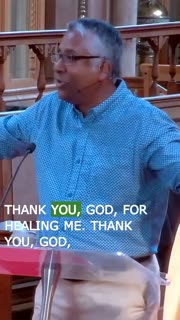Joyful Praise: Deliverance and Dependence on God
Devotional
Sermon Summary
Bible Study Guide
Sermon Clips
1. "David is saying, it's like I was drowning, drowning in the sea. God, you came up and you yanked me up. You hauled me up. You pulled me up so that I could live. And David's joyful. He's, dare I say it, excited. He's excited as he's seen God. singing this. Look how enthusiastic he is about saying thank you. Verse 11, probably mention this again. You turned my wailing, not with harpoons and stuff like that, you turned my wailing, my sadness into dancing. You removed my sackcloth and you clothed me with joy." [45:03] (48 seconds)
2. "David was saying, I'd got used to success. I'd got used to people saying I was great. And I started to think that nothing was going to affect me ever more, that life was just going to be plain sailing. And it was all of my own doing that I was so great. And then when that happened, I started to wobble. And he feels as though God's correcting him. Maybe God was even disciplining him, allowing this to happen to get his focus back. But the good thing is that David does get his thinking straight. He cries out for mercy. God rescues him. And he's not going to be shaken. He heals him." [48:45] (44 seconds)
3. "Jesus was really alive. He really died. He truly rose to life. He was truly raised up from the realm of the dead. He went down and to the pit and was restored. His body came back to life. His heart started beating again. He began to breathe. And people cried at Jesus's death. They were there at the foot of the cross. People died. They mourned him. Then when he came back to life, they celebrated. They celebrated with him." [51:35] (33 seconds)
4. "Jesus, who loved God perfectly, who loved his neighbor, who loved people around him as he loved himself, Jesus died as a sacrifice for us. And then he was raised to life, to show that the sacrifice was accepted by God, the father. So that all who turn to Jesus and all who cry out to Jesus for mercy, those who cry out to Jesus for salvation and healing will be lifted up." [54:10] (31 seconds)
5. "Thank you, God, for healing me. Thank you, God, for saving me. Thank you, God, for rescuing me. How do we do it? Hands in pockets. Thank you, God. We say, thank you, with joy. We say, thank you, with big hearts, with big emotion. Mention verse 11 and 12. Let me read them again. You turned my wailing into dancing. You removed my sackcloth and clothed me with joy, that my heart may sing your praises and not be silent. Lord, my God, I will praise you forever." [55:24] (54 seconds)
6. "Jesus, the King. Jesus, the good King. Jesus, who suffered for us. Jesus, who died for us. And Jesus, who is now the victorious King. And his victory now means our victory too." [59:47] (16 seconds)
7. "Help us to be people who would truly live with Jesus as King over every area of our lives. And help us to be people who would celebrate that. Lord, we cry that we ask that your Holy Spirit would stir a joy and a thanksgiving and a celebration in our hearts, that we might praise you for rescuing us. We pray that we might even start that today. We ask in Jesus's precious name. Amen." [01:01:00] (39 seconds)
Ask a question about this sermon
2. "David was saying, I'd got used to success. I'd got used to people saying I was great. And I started to think that nothing was going to affect me ever more, that life was just going to be plain sailing. And it was all of my own doing that I was so great. And then when that happened, I started to wobble. And he feels as though God's correcting him. Maybe God was even disciplining him, allowing this to happen to get his focus back. But the good thing is that David does get his thinking straight. He cries out for mercy. God rescues him. And he's not going to be shaken. He heals him." [48:45] (44 seconds)
3. "Jesus was really alive. He really died. He truly rose to life. He was truly raised up from the realm of the dead. He went down and to the pit and was restored. His body came back to life. His heart started beating again. He began to breathe. And people cried at Jesus's death. They were there at the foot of the cross. People died. They mourned him. Then when he came back to life, they celebrated. They celebrated with him." [51:35] (33 seconds)
4. "Jesus, who loved God perfectly, who loved his neighbor, who loved people around him as he loved himself, Jesus died as a sacrifice for us. And then he was raised to life, to show that the sacrifice was accepted by God, the father. So that all who turn to Jesus and all who cry out to Jesus for mercy, those who cry out to Jesus for salvation and healing will be lifted up." [54:10] (31 seconds)
5. "Thank you, God, for healing me. Thank you, God, for saving me. Thank you, God, for rescuing me. How do we do it? Hands in pockets. Thank you, God. We say, thank you, with joy. We say, thank you, with big hearts, with big emotion. Mention verse 11 and 12. Let me read them again. You turned my wailing into dancing. You removed my sackcloth and clothed me with joy, that my heart may sing your praises and not be silent. Lord, my God, I will praise you forever." [55:24] (54 seconds)
6. "Jesus, the King. Jesus, the good King. Jesus, who suffered for us. Jesus, who died for us. And Jesus, who is now the victorious King. And his victory now means our victory too." [59:47] (16 seconds)
7. "Help us to be people who would truly live with Jesus as King over every area of our lives. And help us to be people who would celebrate that. Lord, we cry that we ask that your Holy Spirit would stir a joy and a thanksgiving and a celebration in our hearts, that we might praise you for rescuing us. We pray that we might even start that today. We ask in Jesus's precious name. Amen." [01:01:00] (39 seconds)







